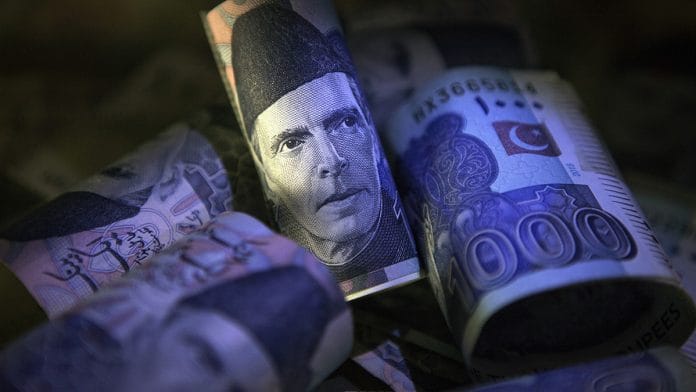Here’s what’s happening across the border: IMF and World Bank have some crucial suggestions for Pakistan to alter economic landscape; President’s house lit up pink to promote breast cancer awareness.
In a first, Pakistan’s next IMF bailout to be its biggest
Pakistan government’s recent decision to seek an International Monetary Fund (IMF) bailout is reportedly going to be worth $8 billion, the largest monetary amount it has ever asked IMF of all its last dozen financial support packages, reported Dawn.
Quoting diplomatic sources, the report said IMF could place stringent restrictions on Pakistan, compelling it to hunt for additional loans to meet just those requirements leading the total loan amount to touch as high as $12 billion.
The country’s finance minister Asad Umar’s announcement Monday confirming the government’s decision to approach IMF came after Pakistan witnessed the highest single-day loss in a decade’s time of its stock market.
The stock market crashed by over 1,300 points Monday leading to a loss of Rs 270 billion, in terms of capitalisation.
Meanwhile, in an effort to address concerns regarding the worsening economic climate, Prime Minister Imran Khan Wednesday assured that he will “steer you [the country] out of its difficult time”.
He added that a wrong perception about the country’s situation had been contrived, saying “as if the sky is going to fall [or] the day of judgement is upon us”.
Khan said the current economic status of the country was to be attributed to the previous governments under whom the country’s debt mushroomed from Rs 6 trillion to Rs 30 trillion. He said with his government’s relentless economic measures, it will take around “6 months to show results”.
IMF, World Bank have suggestions for Pakistan to tackle economic meltdown
At a news conference Tuesday, IMF chief economist Maurice Obstfeld said Pakistan must ensure it does not land itself into “excessive debts” by means of its trade agreements with China under the China-Pakistan Economic Corridor, Dawn reported.
Obstfeld said Pakistan was in the need for more infrastructural development.
While recognising China’s financing of Pakistan’s infrastructural developments could be a good support, Obstfeld said China’s involvement could also pose certain risks.
“It is important that the design of the projects… be solid and excessive debts which cannot be repaid are avoided,” he said.
The conference was organised as part of the ongoing annual meetings between IMF and World Bank being held in Indonesia’s Bali.
In addition, the World Bank issued a report Monday titled ‘At a Crossroad” highlighting the country’s fiscal deficit issue. It suggested policy measures that can be worked upon to bridge the gap between fiscal deficit and the target.
The report said Pakistan’s macroeconomic challenges are structural in nature that have worsened due to poor domestic policy choices and an unstable weak external environment. The structural challenges include low rates of investment and the country’s low rates of success with raising investment sustainably.
The report also predicted an improvement in the GDP growth to 5.2% by fiscal 2020.
ISI’s new chief has a stellar intelligence background
Lt General Asim Munir has been appointed the new director of Pakistan’s premier intelligence agency, Inter-Services Intelligence (ISI), and will take on the role after current chief Lt General Naveed Mukhtar retires on 25 October, Dawn reported.
The announcement was made Wednesday by the army’s media wing Inter-Services Public Relations.
The move marks the first major military-related posting by the Imran Khan government. The intelligence chief’s choice was finalised after the Prime Minister’s consultation with the army.
Munir, who was promoted to the ranks of a three-star general on 28 September, previously headed the Military Intelligence as its director general. His case is only the fourth such in Pakistan’s history where a Military Intelligence chief has been appointed as ISI’s head.
Munir is believed to be Army chief General Qamar Javed Bajwa’s most-trusted person. As the Force Commander Northern Areas, Munir worked under Bajwa’s leadership.
He was presented with Hilal-i-Imtiaz, Pakistan’s second highest civilian and military award, in March 2018.
President’s house to celebrate breast cancer awareness month
To promote breast cancer awareness in October, President Arif Alvi’s wife, Begum Samina Alvi, illuminated the entire building of the Aiwan-e-Sadr (President’s house) with pink light, reported Pakistan Today.
At a ceremony held at President’s residence Wednesday, Samina inaugurated the Pink Ribbon campaign.
The colour pink is considered a symbolic choice for extending support for breast cancer awareness initiatives.
First Lady Begum Samina Alvi launched the elimination of breast cancer campaign under the auspices of Pink Ribbon in Islamabad. She urges the media to play an active role in creating awareness among masses about the disease. #BreastCancerAwareness pic.twitter.com/pgKKZEtKJl
— Govt of Pakistan (@pid_gov) October 10, 2018
Speaking at the event, Samina said the disease was on the rise in Pakistan due to lack of awareness. She said every third woman was at the risk of breast cancer in Pakistan. She also expressed hope that timely diagnosis can help people to take precautions and cure their disease.
Alvi urged doctors and other professionals to talk about breast cancer on morning TV shows.
A scientific and geographical phenomenon behind Karachi’s stench
Karachi citizens reported a foul smell Wednesday which was more evident in the southern and western parts of the city’s coastal areas, said a report by The News International.
According to WWF-Pakistan, the cause of the unpleasant smell was the collapse of the phytoplankton bloom triggered by sea-dwelling Noctiluca.
With the end of the monsoon season and alterations in the currents and winds patterns in the past few days, a subsequent bleaching and collapse of this bloom was noticed on the coast.
Karachi was witness to a similar incident on 31 May, 2017.






